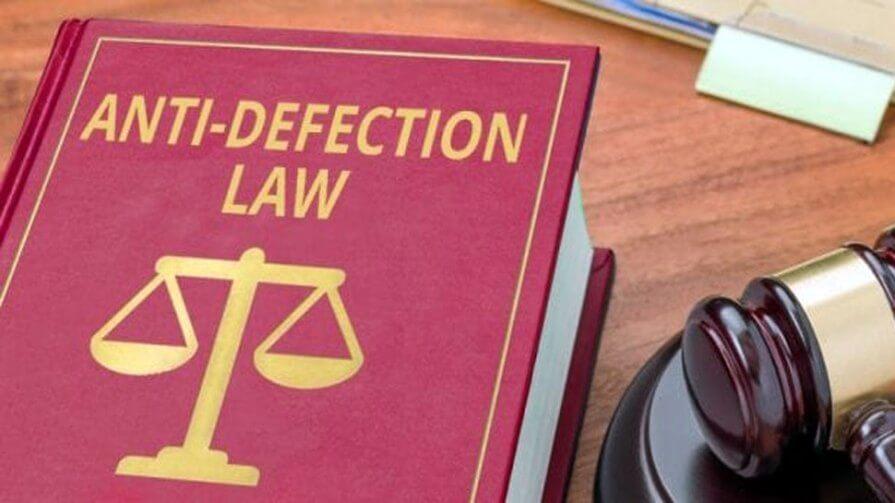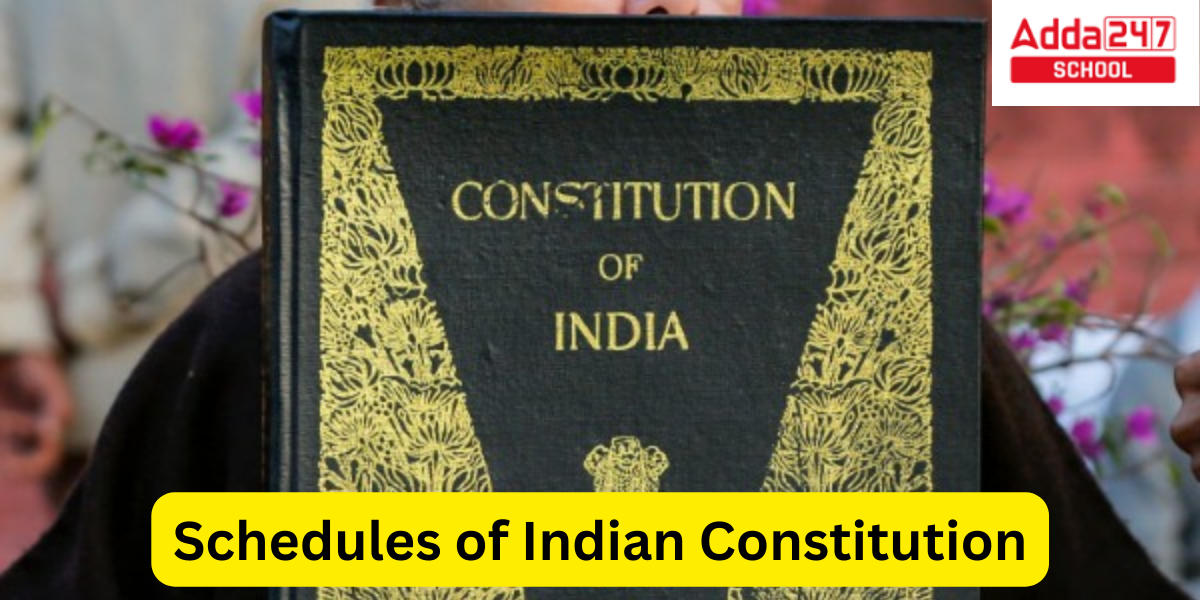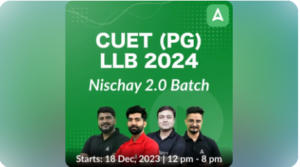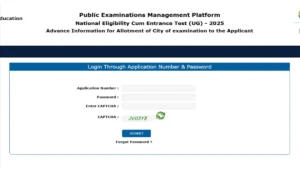Table of Contents
Schedule of Indian Constitution
The total number of schedule of indian constitution is 12. The Government of India Act, 1935, which comprised 10 Schedules, provided one of the earliest references to Schedules. The Indian Constitution later had 8 Schedules when it was enacted in 1949. There are now a total of 12 Schedules according to the Indian Constitution’s changes.
Schedule of Indian Constitution Structure
The longest constitution for a sovereign state in the world is that of India. It contained 395 articles divided into 22 parts and 8 schedules when it was enacted. It is the second-longest active constitution in the world, after the Constitution of Alabama, with roughly 145,000 words. The schedule of Indian constitution structure are given below.
A prologue and 470 articles, divided into 25 parts, make up the Constitution. It includes 12 schedules and 5 appendices, has undergone 105 amendments, the most recent of which took effect on August 15, 2021.
Constitution of India Articles, Preamble and Purpose
The constitution has schedules, which are lists that classify and summarize governmental operations. Following are the 12 schedules of the Constitution of India and the respective Articles related to them:
First Schedule of Indian Constitution Tricks to Remember List
The names of the States and Union Territories are listed in the First Schedule of the Indian Constitution. States’ territorial jurisdiction is also covered in this Schedule of the Indian Constitution.
Articles of First Schedule of Indian Constitution
Article 1 and Article 4
Second Schedule of Indian Constitution
The provisions concerning the benefits, perks, and emoluments of:
- The President of India
- The leaders of the Indian States
- Deputy Speaker and Speaker of the Lok Sabha
- Deputy Chairman and Chairperson of the Rajya Sabha
- Speaker and Deputy Speaker of Indian State Legislative Assemblies
- Chairman and Deputy Chairman of Indian State Legislative
- Councils Supreme Court Judges High Court Judges
- India’s Comptroller and Auditor General (CAG)
Articles of Second Schedule of Indian Constitution
Articles of the Second Schedule of the Indian Constitution are: Article 59, Article 65, Article 75, Article 97, Article 125, Article 148, Article 158, Article 164, Article 186, and Article 221.
Third Schedule of Indian Constitution
It includes the oath and affirmation forms for:
- Indian Union Ministers
- Candidates for the Parliament
- Members of Congress (MPs)
- Court of Appeals justices
- General Comptroller and Auditor
- Ministers of State
- Candidates for State Legislature Elections
- Members of state legislature
- Supreme Court justices
Articles of Third Schedule of Indian Constitution
Articles of the Third Schedule of the Indian Constitution are: Article 75, Article 84, Article 99, Article 124, Article 146, Article 173, Article 188, and Article 219.
Fourth Schedule of Indian Constitution
It includes the rules regarding the distribution of seats between States and Union Territories in the Rajya Sabha.
Articles of Fourth Schedule of Indian Constitution
- Article 4 and Article 80
Fifth Schedule of Indian Constitution
It includes provisions relating to the management and oversight of designated areas and designated tribes.
Articles of Fifth Schedule of Indian Constitution
- Article 244
Sixth Schedule of Indian Constitution
It includes guidelines for the management of tribal lands in the states of Assam, Meghalaya, Tripura, and Mizoram.
Articles of Sixth Schedule of Indian Constitution
- Article 244 and Article 275
Seventh Schedule of Indian Constitution
This schedule deals with the three legislative lists:
- Union
- State
- Concurrent
Articles of Seventh Schedule of Indian Constitution
- Article 246
Eighth Schedule of Indian Constitution
It covers the 22 official languages that the Indian Constitution recognises:
- Assamese
- Bengali
- Bodo
- Dogri (Dongri)
- Gujarati
- Hindi
- Kannada
- Kashmiri
- Konkani
- Mathili (Maithili)
- Malayalam
- Manipuri
- Marathi
- Nepali
- Oriya
- Punjabi
- Sanskrit
- Santhali
- Sindhi
- Tamil
- Telugu
- Urdu
Articles of Eighth Schedule of Indian Constitution
- Article 344 and Article 351
Fundamental Rights of Indian Constitution
Ninth Schedule of Indian Constitution
- It covers state legislation and rules pertaining to land reform and the dismantling of the zamindari system. It also covers the laws and rules passed by the Parliament that deal with other issues.
- The Ninth Schedule was added by the First Amendment Act of 1951 in order to shield the laws contained therein from judicial review for any violations of basic rights.
- The Supreme Court, however, declared in 2007 that the statutes added to this timetable after April 24, 1973, are now subject to judicial scrutiny.
Articles of Ninth Schedule of Indian Constitution
- Article 31-B
List of Amendments in Indian Constitution
Tenth Schedule of Indian Constitution
It includes regulations relating to the disqualification of members of the State Legislatures and the Parliament on the basis of defection. The 52nd Amendment Act of 1985, often known as the Anti-defection Law, added this schedule.
Articles of Tenth Schedule of Indian Constitution
- Article 102 and Article 191
Anti-defection Law
- In many democracies, politicians leave their parties.
- They might potentially threaten the stability of the cabinet, which depends on the backing of elected lawmakers.
- The logical conclusion is that such instability might amount to a betrayal of the will of the people as expressed in the most recent election before that.
- Before the anti-defection law was passed, there had been instances of apparent confusion brought on by legislators switching their party allegiance during the election of the Prime Minister and Chief Ministers of certain of its states and territories.
- It should be emphasised that at the time, the term “political party” was not recognised in the Indian Constitution.
- According to one estimate, over half of the 4,000 lawmakers elected to the central and federal parliaments in the general elections of 1967 and 1971 later deserted, causing political unrest in the nation.
- In India, a law was sought to restrict these defections.
- To accomplish this, the Indian Parliament passed the Tenth Schedule of the 52nd amendment to the Indian Constitution in 1985, which led in the addition of the new word “Political Party” to the Indian Constitution.
- As a result, the Constitution now recognises political parties.

The Parliament of India passed the ninety-first amendment to the Indian Constitution in 2003 as a result of proposals from numerous constitutional bodies. By including clauses that disqualify defectors and temporarily bar their appointment as ministers, this enhanced the statute.
To Read in More detail about the Anti-defection Law in India, Read,
Anti Defection Law in India, Amendment and Schedule
Eleventh Schedule of Indian Constitution
It includes clauses that outline Panchayats’ rights, obligations, and scope of authority. There are 29 matters. This programme was added by the 1992 73rd Amendment Act.
Articles of Eleventh Schedule of Indian Constitution
- Article 243-G
How to Vote in India? Know the Voter Registration Process
Twelfth Schedule of Indian Constitution
It deals with the clauses that outline the duties, rights, and obligations of municipalities. There are 18 matters. This programme was added by the 1992 74th Amendment Act
Articles of Twelfth Schedule of Indian Constitution
- Article 243-W
Schedule of Indian Constitution Tricks for CUET PG and Law Exams
Below is the video to learn the tricks for remembering the Schedules of Indian Constitution Part 1 for CUET PG, DULLB 2023, CLAT 2024, AILET 2024 and MHCET Law:
Below is the video to learn the tricks for remembering the Schedules of Indian Constitution Part 2 for CUET PG, DULLB 2023, CLAT 2024, AILET 2024 and MHCET Law:
Constitution of India: Video for CUET PG Preparation
Below is the video of Constitution of India for CUET PG, DULLB 2023, CLAT 2024, AILET 2024, and other Exams:
Constitution of India: Video for Law Preparation
Below is the Video of Constitution of India Part 1, for Preparation of Law Exams like DULLB 2023, AILET 2024, CLAT 2024, and MHCET Law:
Below is the Video of Constitution of India Part 2, for Preparation of Law Exams like DULLB 2023, AILET 2024, CLAT 2024, and MHCET Law:
Total Coastal and Geographical Area Of India
Important Articles of Indian Constitution






 NEET City Intimation Slip 2025 Available...
NEET City Intimation Slip 2025 Available...
 PSEB 12th Result 2025 @pseb.ac.in, Punja...
PSEB 12th Result 2025 @pseb.ac.in, Punja...
 CUET UG Date Sheet 2025 @cuet.nta.nic.in...
CUET UG Date Sheet 2025 @cuet.nta.nic.in...










